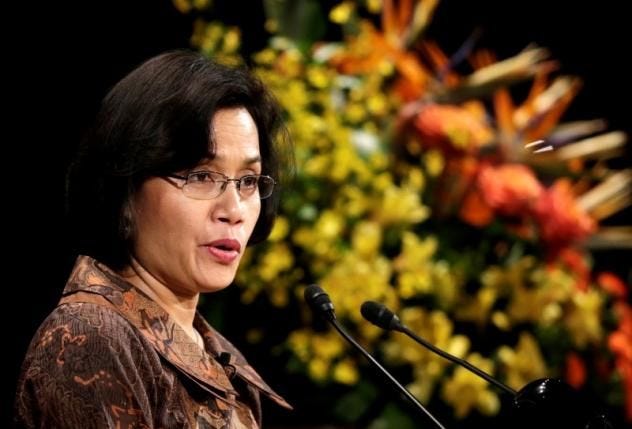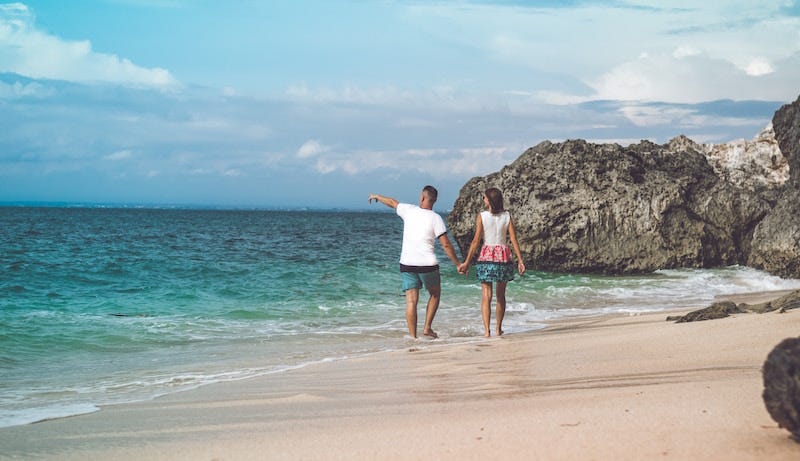Hello Coconauts,
It was a veritable see-saw of will they and won’t they, but the government eventually stuck to their guns and stood firmly in favor of public health (or possibly business interests) with the expansion of their mandatory PCR testing rules.
Most of the implications are, of course, on travel, which has seen an uptick since COVID-19 cases began declining, judging by the recent onslaught of domestic tourists in popular destinations.
On that note, let’s get swabbed and take off on this free edition of Indonesia Intelligencer. Do share and subscribe!
Stay safe, stay informed, and we’ll see you next week!
Business and the economy
Bullish economy
Indonesia’s Finance Minister Sri Mulyani Indrawati described the country’s economy as “quite bullish” and that the economic impact from the mid-year COVID-19 wave was not “too deep,” as the ministry projects 4.5 percent GDP growth for Q3 2021.
The forecast was revised upward from 4-5 percent previously, largely owing to rising exports — most notably thermal coal and palm oil — and recovery in household consumption with anti-virus measures relaxed.
Indonesia’s economy grew 7.07 percent in Q2, but there have been concerns of great economic toll after the country experienced its most devastating COVID-19 wave yet in July and August. Official Q3 growth figures is set to be announced on Nov. 5.
Sri Mulyani also gave a new official forecast for 2021 full-year growth of 4 percent, compared with a previous forecast of 3.7-4.5 percent.
Amid the positive sentiments, the minister warns of potential headwinds to Indonesia’s economic growth, namely tapering in the US and the EU, a potential slowdown in China's economic growth, and rising inflation globally.
The lion’s share
Singapore topped the list of sources of overseas investors in Indonesia for Q3 2021, with US$2.6 billion, or 36.2 percent of total foreign investment, coming from the Little Red Dot during the period.
From January to September 2021, US$7.3 billion have come in from Singaporean investors, accounting for 32 percent of total foreign investment in the year.
Other major contributors to foreign investment include Hong Kong, China, Japan, and the Netherlands.
New players in EV?
Taiwan’s Foxconn, the largest electronic components manufacturing company in the world, and electric scooter makers Gogoro have expressed interest in investing in Indonesia's battery and electric vehicle (EV) industries.
Foxconn praised Indonesia’s “tremendous potential” in all things EV, and the company plans to build a “whole industry for Indonesia in Indonesia” comprising an integrated electric battery and EV factories.
South Korean giants Hyundai and LG in September began construction of a US$1.1 billion EV battery plant — the first of its kind in Southeast Asia — in the first major step to Indonesia utilizing its rich nickel reserves.
In with the new
The Indonesia Stock Exchange (IDX) has approved a new trading category for new economy stocks in 2022, which would comprise companies operating in the realm of internet-driven innovation and digital banks.
IDX says it will also continue developing its electronic IPO platform, as well as introducing carbon-based trading initiatives for 2022.
Telkom’s ambitious IPO
Mitratel, the tower subsidiary of state-owned telco Telkom, is aiming to raise up to IDR24.9 trillion (US$1.76 billion) through its IPO, which would break the IDR 21.9 trillion (US$1.54 billion) record set by e-commerce platform Bukalapak in August.
That’s assuming the IPO will be priced at the top of the range of IDR775-975 (US$0.055-0.069) per share. Mitratel is offering new shares representing 29.85 percent of the company.
Mitratel's IPO road show and book building will run through Thursday of next week, after which the company is planning its market debut at the Jakarta bourse on Nov. 22.
More than IKEA
Archipelagic nations Indonesia and Sweden have signed a statement on blue economy cooperation as part of efforts to accelerate economic transformation towards more inclusive and sustainable development.
Under the cooperation, a road map is being set up in which Indonesia could learn from Sweden’s success with its blue economy strategy, which covers blue-growth strategy and marine spatial planning.
Sharia Fest 2021
Indonesian Vice President Ma’ruf Amin this week launched the 8th annual Indonesia Sharia Economic Festival (ISEF), with this year’s theme being developing sharia economy and finance amid challenges from COVID-19.
Indonesia last week expanded its mandatory halal goods legislation in a bid to streamline certification processes and exports to other Islamic markets (see last week’s newsletter).
Recommended reads
Ashar’s experience is not uncommon. Before the pandemic hit, more than a third of young adults in Indonesia wanted to run their own businesses, according to a World Economic Forum survey of youth attidues in the region. But while the number of startups has boomed in Southeast Asia’s largest economy, young entrepreneurs with little business experience have struggled to persuade would-be investors to provide the capital they need to grow.
Indonesia missing out in carbon trading (The Jakarta Post)
While Indonesian authorities work out the kinks of the country’s budding emissions trading system, companies are taking matters into their own hands by trading carbon credits overseas. Indonesia is losing out in the carbon trading business.
Across the archipelago
The PCR saga
The government this week lowered the price ceiling for PCR tests from IDR495K (US$35) to IDR275K (US$19.40) in Java and Bali, as the gold standard COVID-19 diagnostic tool is set to become mandatory for all domestic travel in the country.
Mandatory PCR testing first became mandatory on all domestic flights, removing the relatively less reliable but cheaper rapid antigen test from the now-singular list of accepted screening tools. The government then announced plans to expand mandatory PCR testing on all forms of intercity/province public transportation in a bid to prevent another COVID-19 wave in the lead up to and after the year-end holiday.
While the move was backed by health experts, the average Indonesian felt shortchanged, as a single PCR test could be more expensive than a plane ticket, let alone bus or train fare. Under instruction from President Joko Widodo, the Health Ministry evaluated PCR test costs and agreed to lower prices to IDR275K for Java and Bali and IDR300K (US$21) for everywhere else — both of which are considered still economically feasible.
Bailing on Bali
Bali, the gauge upon which demand for domestic travel in Indonesia is measured, was initially uneasy about the new PCR test requirements, with an association of hotels on the island reporting widespread hotel booking cancelations just as tourism was lifting off once again.
But the Bali Provincial Government showed is upbeat that the numbers would pick up again after PCR test prices were lowered, estimating around 10,000 daily domestic arrivals in Bali for the year-end holidays. Currently, around 6,500 Indonesians visit Bali each day.
And it seems Bali will continue to depend on domestic tourists for its economic recovery for the foreseeable future, as there has yet to be reports of any meaningful uptick in international tourism numbers. Australians, however, may be one step closer to Bali following updated travel advice.
Collective sigh
In addition to strengthening PCR test requirements, the government also this week reiterated that the year’s last collective leave day, originally scheduled for Dec. 24, has been canceled in order to discourage year-end travel.
Other than Christmas Day, there are no scheduled public holidays for the remainder of 2021.
Recommended reads
Indonesia mysteriously mum on China sea incursion (Asia Times)
Fast forward a year and almost the opposite has happened with officials struggling to explain why a Chinese survey vessel was allowed to spend seven weeks conducting intensive seabed mapping inside Indonesia’s economic exclusion zone (EEZ) south of the Harbour Energy concession.
Poisonous waste plagues Indonesia’s once bountiful Citarum River (Southeast Asia Globe)
Back in the 1980s, Sumiyati and her friends used to bathe, wash clothes and catch fish for barbecues in the Citarum River, which flows through their village in Indonesia’s Karawang district.
Those days are only a distant memory, as Citarum is now considered one of the world’s dirtiest rivers and fish are no longer plentiful.
Sukmawati, daughter of Indonesia’s Sukarno gives up Islam, embraces Hinduism in conversion ‘with no obstacles’ (South China Morning Post)
Some went a step further to say that Sukmawati Sukarnoputri’s religious conversion – which would be considered blasphemous in other Muslim-majority nations including Malaysia – could be interpreted as her opposition to the growth in political Islam in Southeast Asia’s largest economy.
However, around the world, millions of girls have been schooled under similar conditions, often inspired by strict interpretations of Sharia law. In particular, Indonesia can serve as an important model for the Taliban of how Muslim nations and faith-based organizations can play an important role in expanding girls’ education.
Top Coconuts Jakarta stories this week
Indonesian companies pull ads featuring Korean actor Kim Seon-ho amid controversy
PCR test now mandatory for domestic flights as Health Ministry seeks to minimize false negatives
Indonesia mourns Canon the dog amid allegations of animal brutality in the hands of Aceh authorities
Satpol PP officers caught naked with sex worker were ‘undercover,’ says boss
Top Coconuts Bali stories this week
Australians one step closer to Bali as gov’t updates travel advice
Tourists cancel Bali trips after PCR tests became mandatory for domestic flights: hotel association
Foreign tourists escaping quarantine in Bali could be deported, warns official
Top Indonesian minister says Bali bars and clubs are getting away with health protocol violations
Daughter of Indonesia’s first president Sukarno embraces Hinduism in Bali







